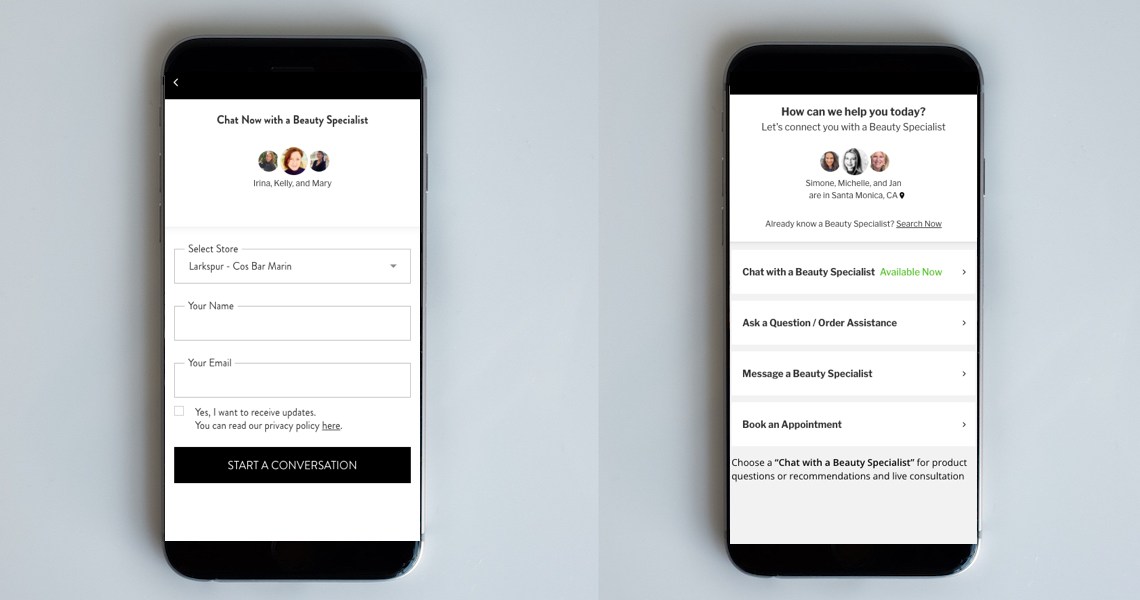When the pandemic lockdowns hit in 2020, beauty brands rushed to add virtual consultations to their websites, in response to store shutdowns. Two years in, these services are being used as part of an omnichannel strategy as the pandemic situation continues to fluctuate.
“Today, customers are expecting a seamless experience across channels,” said Oscar Sachs, CEO of tech provider Salesfloor, which works with beauty brands and retailers including Shiseido, Eva NYC, Tatcha, Cos Bar, Shoppers Drug Mart, Bloomingdale’s and Amika. At a time when Covid-19 waves are coming every few months and new threats such as monkeypox emerge, brands are working to find omnichannel adaptations amid uncertainty about future customer behavior.
Since the pandemic began, demand has skyrocketed for virtual consultations. For Salesfloor, the company’s business has doubled. Virtual consultations platform Hero, which has worked with beauty companies including Credo Beauty and Deciem to enable online consultations with store associates, was scooped up in an acquisition by Klarna in 2021 for about $160 million. Klarna subsequently unveiled a virtual shopping option to its clients using Hero technology allowing chats with store staff.
Pre-pandemic, brands were “slowly” putting virtual consultation “on their roadmap, and they were getting ready for those kinds of tools,” said Sachs. “The pandemic basically took four years and crammed it all into one.”
Brands crafting their virtual consultation strategy have the choice to use either physical store associates or chatbots. For those with store associates they can leverage, there are several key considerations. Companies offering physical store associate consultations include Cos Bar, Shoppers Drug Mart, Credo Beauty (which now works with Salesfloor as well) and Sephora.
One main consideration is localization, which is “very important” to the shopping experience, said Sachs.
“Leveraging a physical footprint that is located near the customer is a great way to engage customers online because many of them end up in the store afterward,” he said. “If you put experts in a call center to serve customers online, you can’t develop a relationship with them. You can’t visit them the next day in the store. You can’t start that experience online and then finish in-store to touch and feel products.”
On its site, Cos Bar offers virtual consultations with specific store associates, allowing shoppers to select nearby stores recommended via geolocation. According to CEO Oliver Garfield’s statement when the feature was launched in November 2020, the offering “extends the personalized experience of beauty experts to digital channels and allows beauty specialists to build and nurture one-to-one relationships with their customers.”
According to a Glossy Beauty Podcast interview with Carolyn Bojanowski, svp and gm of e-commerce at Sephora, the retailer experimented with virtual consultation formats when lockdown began. The retailer made predictions about customer demands, but then pivoted after realizing what they actually wanted. “We thought it would be 20-minute full-face consultations and that they might even want to do video,” she said, noting that “quick hits were what our clients wanted,” meaning fast text chats with beauty advisors.
For brands without a physical store, AI chatbots are also an option.
“In luxury, it’s all about the associates. The more you start to come down from luxury, the more volume that associates have on the website. They are [then] trying to interact with the customer in simple ways to help them narrow their choices,” said Sachs.
Chatbots are also a proven sales driver. Eva NYC, which implemented a chatbot it calls “Viva” using Salesfloor technology in 2021, has seen double the conversion among customers who use the chatbot, compared with those who do not.
“Virtual consultants provide an opportunity to create a personalized site experience for each of your website users, turning new users into repeat customers. Personalized experiences that are powered by first-party data will continue to be critical for success in e-commerce as the market continues to evolve,” said Jane Moran, Eva NYC’s brand vp.
Chatbots are becoming more sophisticated with enhanced with visual representations and connections to site product listings. “It’s not just conversational chat,” said Sachs. “There are actual visual examples where you’re being asked, ‘Do you have oily skin or do you have dry skin?’ and you can visually see what those different skin types are.”
For Eva NYC, products recommended in the chat are also flagged with a “for you” designation in product listings on the site, outlining the reasons they are a match.
According to Salesfloor data, Bloomingdale’s sees a 10-times higher conversion rate online when customers interact with beauty advisors. Shiseido, meanwhile, has received a 50% increase in average order value from its “Storefronts” feature, which allows beauty advisors to display curated products and co-shop with customers.
Sachs predicts that the shift to virtual consultations will be long-term.
“Stores are going to be providing more virtual services, the same way we’re doing it in telemedicine,” he said. “All of a sudden, the store becomes a critical strategy to convert online shoppers. You don’t see it as store versus online.”




